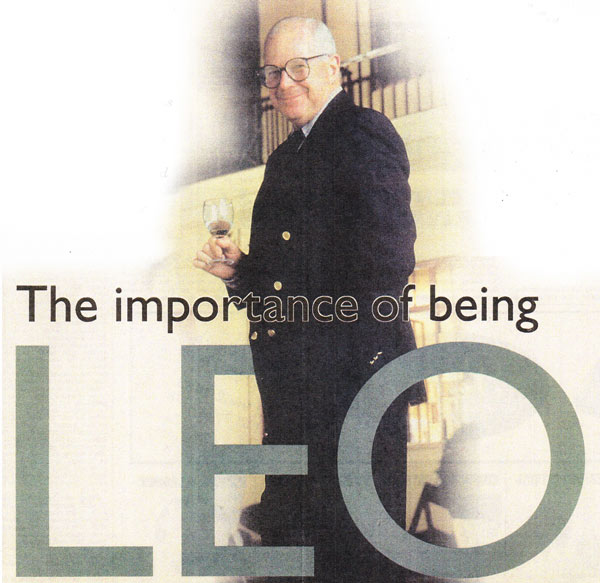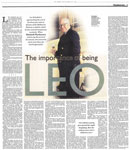This article appeared in the Weekend Australian Review Section 12 October 1996 p3

Leo Schofield was furious. It happened during a hurried meal in a Carlton cafe. Schofield, in his third and final year as the artistic director of the Melbourne Festival, was grabbing a bite to eat before going off to watch the Melbourne Chorale rehearse The Seasons, the Hayden cantata that will open the festival. The rehearsal was in a bleak hall nearby: he'd suggested I tag along to see something of the work behind the scenes that preceded the glittering public occasion. During the past three years this man of prodigious energy and capacities has swept Melbourne before him, winning over a hostile public through a combination of infectious enthusiasm, hardheaded salesmanship, and inspired marketing. So successful has he been that he will direct the Sydney Festival from 1998 until the new millennium. But back in Carlton, at that moment, his attention had snagged on a question he didn't like. His rich, slightly hoarse voice coarsened a trifle as he spoke a little louder than necessary in the almost-empty cafe. The benign expression that often seemed to play over his large, florid face had gone. Or so I judged from the sense that his expansive physical presence was contracting into white points of rage. But I was staring at the table instead of looking him in the face. "If you ask me any more questions like that", he fumed, "I will walk out of this restaurant." I didn't- Not then, anyway – and so he stayed, polishing off his pistachio and duck neck terrine. The conversation that followed was one-sided, however, as Schofield skimmed over everything from the nature of life in Melbourne when the steamships still sailed into port to the fact that Richard Wagner created the festival at Bayreuth largely for his own glorification. He spoke as if his mind were on other things altogether. But by the time he was back in his car, he almost seemed to be his old self again, or so I imagined.
+ + + + + + +
Best known until a few short years ago as a restaurant reviewer, Bon vivant and newspaper columnist, the former public relations man had the ear of Paul Keating, then prime minister, even as hewas winning over Victorian Premier Jeff Kennett, a fellow former adman--bounding in with his easel and flip chart to demonstrate to Kennett what a flourishing arts festival could do for Victoria. He was as good as his word and when the coming festival is over, he'll make a triumphal official return to Sydney as the next best thing to a latter-day Medici. Last summer, soon after it emerged that he's to direct the Sydney Festival the year after next, news of Schofield's appointment as the chairman of the new board of the Sydney Symphony Orchestra completed his apotheosis. Long regarded as an enthusiastic – if formidable – dilittante, he suddenly looms so large over the arts that some arts administrators in Sydney are already moaning about his influence with NSW Premier (and Arts Minister) Bob Carr. How does he do it? "I guess I'm a salesman," 61-year-old Schofield said when we met in his Melbourne office. He was in advertising for many years, of course. "I said to someone the other day: 'I guess I've always been a kind of snake oil salesmen, except now I feel I'm selling a very superior brand of snake oil.' " "If Leo decides that he wants you to do something, it's easier to say 'yes' because he'll persist until you do," says Elizabeth Proust, the head of the Victorian Department of Premier and Cabinet who was on the board that appointed him. " In the early days in Melbourne, there didn't seem to be anybody he didn't know.." "Leo operates on so many levels – that's where he's clever," another Melbourne insider. "It's 6 degrees of separation. Leo can get to anyone." "He's put the festival on the political agenda,"says Stephen Porter, general manager of the Melbourne Symphony Orchestra. Others observe that in his dealings with politicians, Schofield's own short attention span helps him tailor a pitch that stops distracted pols from tuning out or turning around the conversation. "He puts things simply – he gives them a grab," says an arts administrator who has known him a long time. "And he presents it all with a supreme self-confidence in his own judgement that can carry anything before him." Behind the charm, the élan and the sometimes bombastic self-assurance is an exceptional man who reminds one Melbourne woman of a character out of Thomas Hobbes 's Leviathan. Whether people like him or not, they may say that their lives are richer for having known him. To call him larger than life does not start to convey the urgency of the forces that seem to drive Schofield's needs, wants and ambitions, for his restless desire for knowledge to his craving for approbation. Observers say there's no one like him for working a room: prowling a theatre foyer on first nights, he gives the many acquaintances he surprises, greeting them by name, the sense of basking in his company. People will remember running into him in unexpected places. "I was in Bangkok airport, when I came across Leo, gazing somewhat wistfully, I thought, in the window of the Alfred Dunhill shop," says Sydney model agent Jane Cameron. "He said, 'hello, darling, where are you going? and I asked where he had been. 'I just been to a ball in St Petersburg,' he said." Cameron laughed. It happened she had been searching Bangkok airport for a box of tampons. Not at all nonplussed, Schofield offered her a sleeping pill instead. |
"At a dinner party,
|
And yet Schofield spoke almost as if he thought of himself as a victim. He is far from the only eminent Australian to do so, of course. There are so few of them and the media makes so much of them that all the attention gets out of proportion. It certainly has for Schofield, who gets very agitated if he looks like losing a little of his control of his image, one that has been long polished and maintained in the Sydney Morning Herald. By all accounts he is a sort of Svengali for the Herald's editor-in-chief, John Alexander. In any event, Schofield's views and opinions are quoted in the Herald so often that he has assumed the dimensions of a landmark, a sort of beacon flashing messages about good taste from the roof of the Fairfax building at Darling Harbour. But occasionally his opinions have attracted unwanted publicity, such as that generated by the famous "lobster case", when a restaurant proprietor successfully sued him for defamation in what some considered a travesty of justice (if a triumph of the little guy over the glitterati). "The courthouse was filled every day with people who thought the goings-on we're hysterical." Schofield, whose friends say he was hard-hit by the experience, likens it to the time he walked into the firestorms of criticism that greeted him in Melbourne. But it is no less typical of the man that it only added to his determination to show he was made of sterner stuff. "It did stir me on," he said. The sense that he has to go on proving himself replays something of his relationship with his father, who did not find his disapproval of a son interested in music, painting and the theatre. "He was incredibly blokey and I wasn't," Schofield said. Whatever void the relationship with his father left, Schofield seems to have been on a lifelong quest to fill it. He seizes on people, he accumulates information, he piles up houses and objects. First there was St Kevins (the Queen Street, Woolahra residence Keating bought for $2.2 million not so long ago). Schofield and his then wife Anne, did up the dark old pile over many years. The large apartment he occupied and decorated after they separated was said to look curiously unlived-in, like a series of stage sets. Not long before the Melbourne job, however, Schofield got a 15 year lease on Bronte House, a beautiful Georgian mansion that couldn't provide more of a contrast to the circumstances of his family background. That isn't to say he denies his origins. Until he was 12 or so the family had a pub in Brewarrina in the north-west of NSW. "There was no one single object of beauty. A coloured print or something might strike my eye, but the rest had an ineffable dreariness about it." A few years after the pub went bust and they moved to the inner west of Sydney, into a grim little place behind the family ham and beef shop, his uncle was already taking young Leo to see opera at the Tivoli. Schofield shrugged off a question about that part of his life, suggesting that he'd keep it for the autobiography he had been forced to put aside after starting the job in Melbourne. Setting out at the age of 58 to prove himself all over again, he threw himself into his work. "When Leo hit town, he went out and did his admen stuff with his displays and flip charts," says Porter. "He gets his hands dirty. That generates the energy and it's that very energy his critics in the arts world dislike so much." In fact, many people in that world seem to suggest that the programs for Schofields festivals, while classy, had been on the safe side. For his part Schofield spoke instead about those few insistent critics who had continued to snipe at him from the sidelines, asserting that he gets it together like a shopping list, or that all he really knows about is marketing. Despite his success in putting the festival on the map and capturing Melbourne's attention, Schofield is meticulous about remembering criticism. He'll still recited the names of the old Sydney chums he says stood by him and those he feels betrayed him by failing to come to Melbourne for his first festival. "Leo has so many people in his life that occasionally he has to have a clearance sale," says one friend, Sydney decorator Brian Kiernan, who is redoing St Kevin's for the Keatings. In fact some have been friends with him since they worked together in the advertising department of Farmers in the 1950s. Meanwhile, they were all swept up in the theatrical events Schofield organised, with the Sydney University Players. Schofield himself had dropped out of university; to this day, he will approach the things he is passionate about – be it gardening, opera or the decorative arts – with the naked enthusiasm, the appealing lack of cool, of the self-taught man. If he hears about a new piece of music or an unfamiliar plant, he'll know all about it by the next day. But if someone else demonstrates more knowledge or assurance, says a man who has known him for years, "he will be a lamb". I had seen some glimpses of the other Schofield, of course. In fact the week before we met I had phoned to ask for an interview. He had heard I was asking people about him, he said, warning mien what I took to be a joking vein that he had better like the eventual story. I assured him I'd be away on holidays when this article went to print. He'd catch up with me later, Schofield said. I swear his tone was jocular. |

